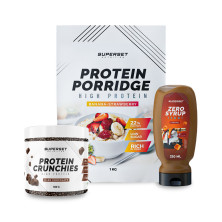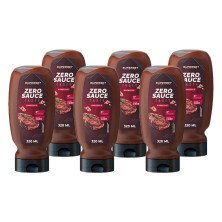€69.90Regular price-€7.80 offPrice
17 products
€69.90Regular price-€7.80 offPrice
€64.90Regular price-€12.80 offPrice
€46.90Regular price-€2.10 offPrice
€35.90Regular price-5.53% offPrice
€28.90Regular price-€2.70 offPrice
€23.90Regular price-€1.30 offPrice
€23.91Regular price-€1.30 offPrice
When dieting, it is better to eat healthy foods to meet your needs while avoiding the intake of bad ingredients.
"Healthy eating" is not improvised, there are some basics to respect: do not eat too fatty, too sweet, too industrial, too salty. Nothing is forbidden, but moderation is the key word for successful diets!
A diet rich in fruits and vegetables with a sufficient intake of complex carbohydrates from whole grains or legumes, proteins from white meats, fish or eggs and good fats from fatty fish, vegetable oils, avocado or oilseeds, is the basis of a balanced diet conducive to achieving any sports or slimming goal!
Eating healthily does not necessarily mean eliminating all fats and sugars. It is important to avoid trans fats and saturated fats and refined sugars that end up having harmful effects on health. It is therefore important to check the composition of foods, snacks and snacks in order to guarantee a maximum of quality nutritional contributions.
Once this balance has been established, you just have to play with the energy balance according to your objective.
It is sometimes useful to use snacks, when you don't have time to eat or to refill your energy quickly before a training session... You just need to know how to choose these foods intelligently.
Here, you will find mainly protein formulas containing few carbohydrates and bad fats and which will bring you essential vitamins and minerals.
What is a healthy diet?
Three criteria are inseparable to have a coherent approach to food quality.
First of all, the nutritional quality of a food is mainly defined by its capacity to provide assimilable nutrients (macros and micros) without ingredients that are harmful to health. The taste aspect also plays an important role for the food to be consumed.
Then, let's talk about variety. It is by varying the foods consumed as much as possible that all the micronutrients essential to our health are present in the body and promote its proper functioning.
Finally, even if the quality is impeccable, all food provides more or less calories. If consumed in excess, some foods can cause weight gain and lead to metabolic and physiological dysfunctions.
For a food to be of "quality" it must contain assimilable nutrients, have a number of calories appropriate to our specific needs and have a pleasant taste.






























